Iceland Travel Guide
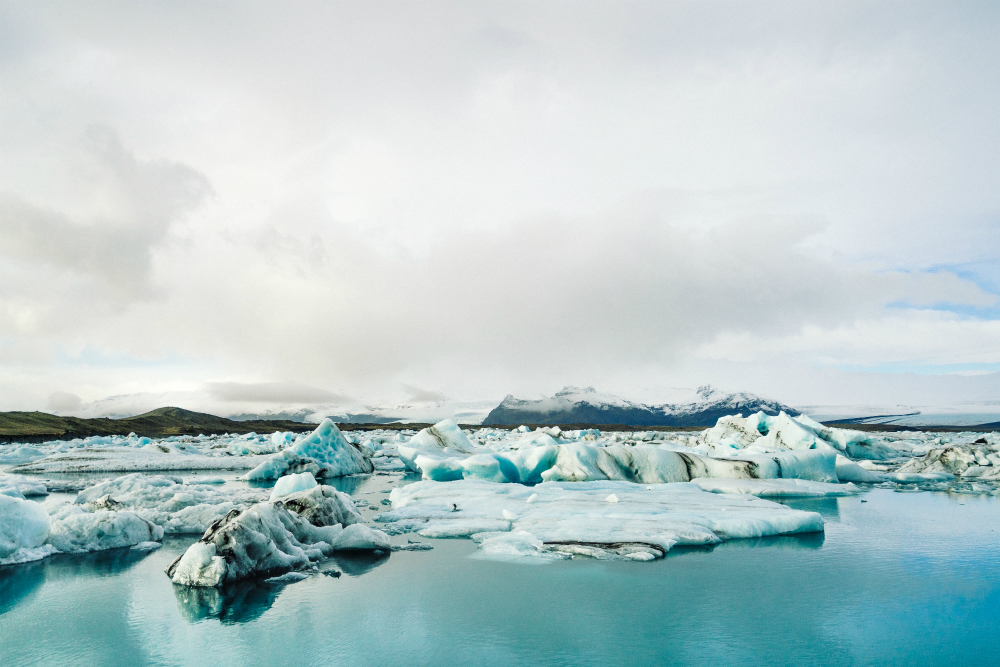
Iceland is a country for adventures. Waterfalls, glaciers, hiking, fjords, whale watching — Iceland is awash with incredible activities for nature lovers and adventurers. On my first trip to Iceland many years ago, I saw some breath-taking sights and have always wanted to explore more of this Nordic country.
Where to Go in Iceland
The ring road that loops around Iceland makes choosing a travel route quite straightforward. You can go clockwise or anti-clockwise. Here are my top picks for an Iceland travel route.
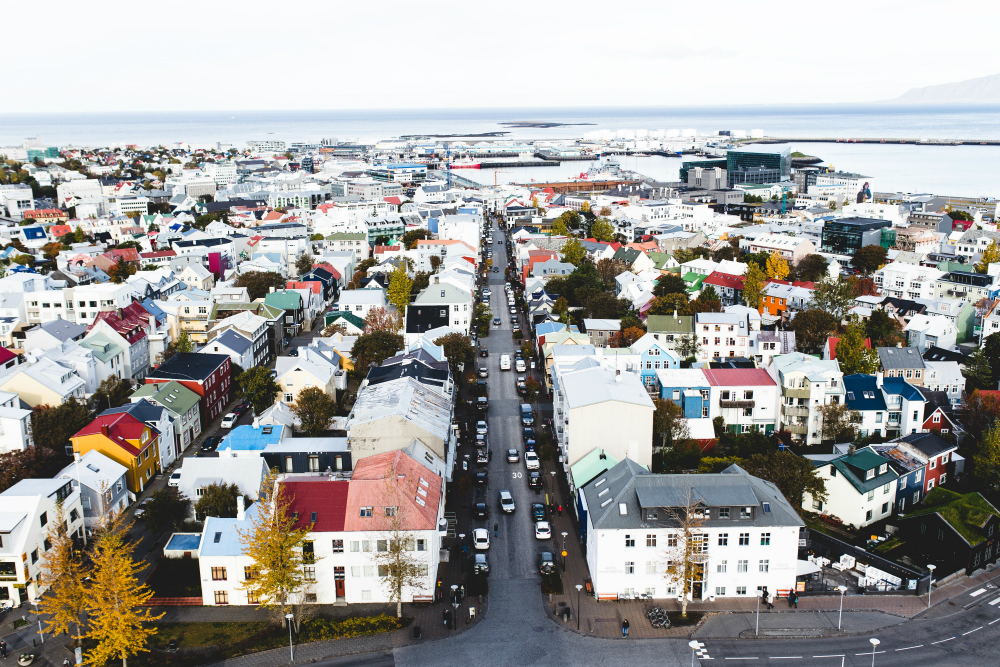
West Fjords — Iceland’s most incredible scenery is on the West Fjords. Stay in the small fishing villages that sit at the bottom of mountains. Ísafjörður is a good base.
Lake Myvatn— This volcanic lake in northern Iceland is a popular place to visit in the north. The Mývatn Nature Baths are a naturally heated lagoon known for their mineral waters. The hot spring area of Hverir is also nearby and a good place to see boiling mud pots and fumaroles.
Húsavík — If whale watching is high on your Iceland itinerary, then this is a good base from which to organise a trip. Remember that whale watching trips only run in the summer.
Höfn — Visit Vatnajökull, Europe’s biggest glacier here!
Jökulsárlón — This glacial lagoon looks absolutely breathtaking. It borders the Vatnajökull National Park and the lagoon flows out into the Atlantic Ocean. Here you can see incredible chunks of blue ice on the black beaches and in winter hundreds of seals come to rest here.
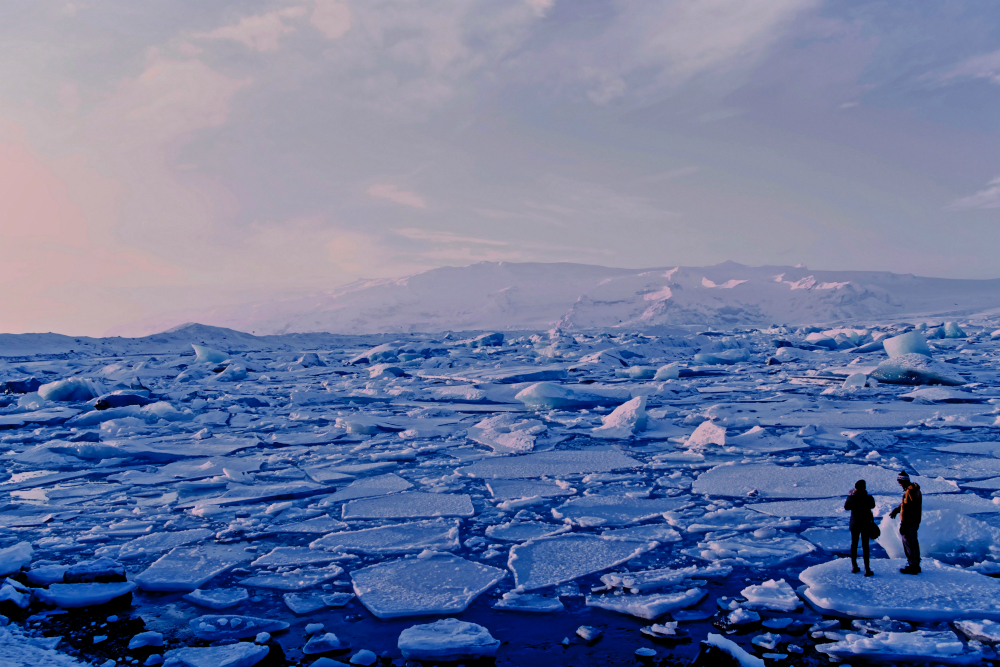
Westman Islands (Vestmannaeyjar) — If you have time to make it to Westman Islands, you’ll be treated to seeing one of the world’s largest puffin colonies.
Best Activities in Iceland
Iceland is one of the most amazing places for outdoor activities. Whether you’re into beautiful scenery, rock formations, hiking and biking, or wildlife watching, Iceland is the place to be.
Northern Lights
The top of many must-do lists for Iceland is the Northern Lights.The aurora borealis can be seen in a number of places including Canada, Alaska, Finland, Norway, Sweden and, of course, Iceland. The further north you travel, the more hours of darkness you have and therefore the more chance of seeing these incredible natural lights across the sky.
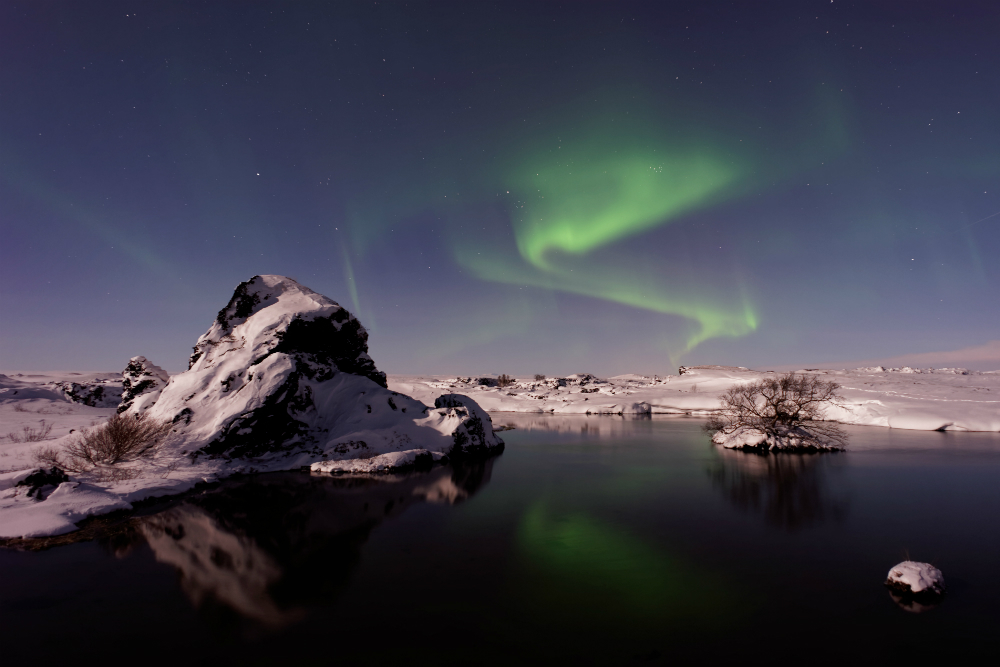
Glacier Hiking
One of the coolest things I did when travelling in Iceland was glacier hiking! We took a snow truck up to the top of the glacier, then walked in the crunchy snow on the top and admired the beautiful blue ice ridges. Some people in my group also did some sledding on top of the glacier but to be honest, it was difficult for them to get a good run because the snow was so thick and compact.
There are glaciers all over Iceland where you can hike, including Svínafellsjökull glacier in the Skaftafell Nature Reserve and Sólheimajökull glacier in southern Iceland where I went.
Whale Watching
Would there be anything more breath taking than a whale watching trip in Iceland? Whale watching is one of those activities I’ve always dreamed of doing but never quite had the opportunity. I only want to partake in ethical whale watching tours, which is one of the big reasons why I’ve not yet seen these amazing creatures.
If you do plan to book onto a whale watching tour, then take the time to look for a responsible, registered tour operator (and read their reviews!) Be wary of any tour operators who guarantee sightings or say that their boats will get up close to the whales – boats should only watch these beautiful animals from a distance.
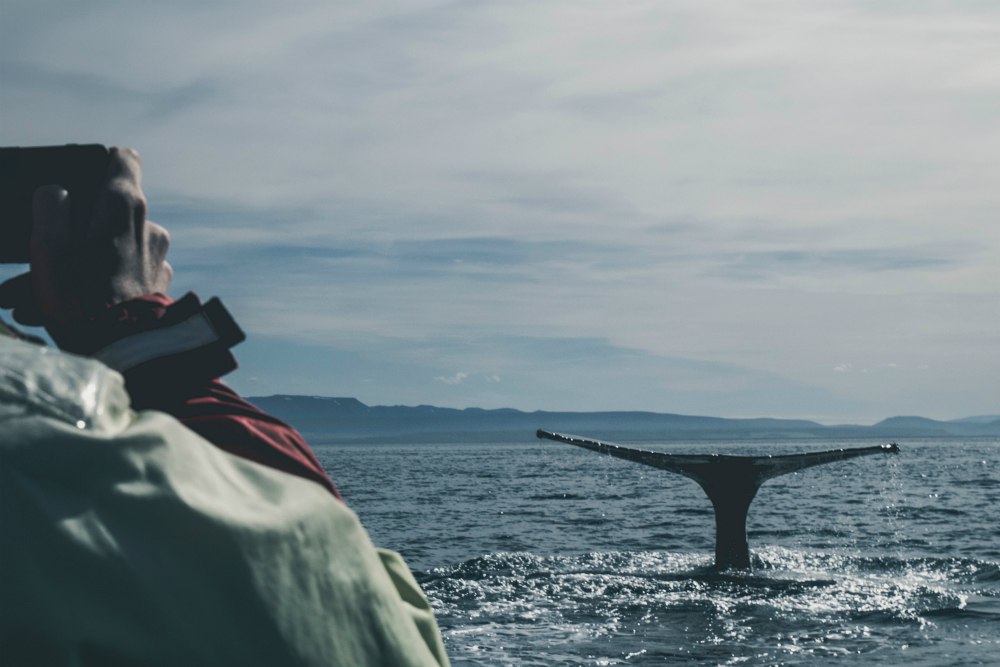
Where to Eat in Iceland
Thinking back to over a decade ago, I remember eating a diet of potatoes and cheese sandwiches due the lacking vegetarian options in Iceland. I’ve heard in recent years that’s started to change, especially in Reykjavik.
Vegan Food in Reykjavik
The vegan food scene in Iceland has really taken off since I visited. Now, I absolutely can’t wait to go back and explore Iceland’s vegan food culture. Mostly Amelie has a mouth-watering vegan food guide to Reykjavik. Top of my list to try are the freshly baked focaccia bread, hearty vegan stews and the vegan brewhouse!
Food on the Go
Grabbing food on the go may be more difficult in Iceland. Restaurants and cafes are not evenly spread and if you’re planning on a road trip away from the major towns, then stock up on provisions when in town — especially if you’re vegetarian and vegan.
Where to Stay in Iceland
Iceland has some gorgeous apartments and cabins for holiday rentals. I’ve spent many an hour browsing Iceland accommodation on Airbnb.
Apartments in Iceland
My dream Iceland Airbnb is this studio apartment in Vaðlaheiði. It’s a bit pricey if you’re travelling in a couple, but if you’re travelling in a group or with friends then the price is much more reasonable. The apartment includes a heated swimming pool and access to hiking routes along the fjord.
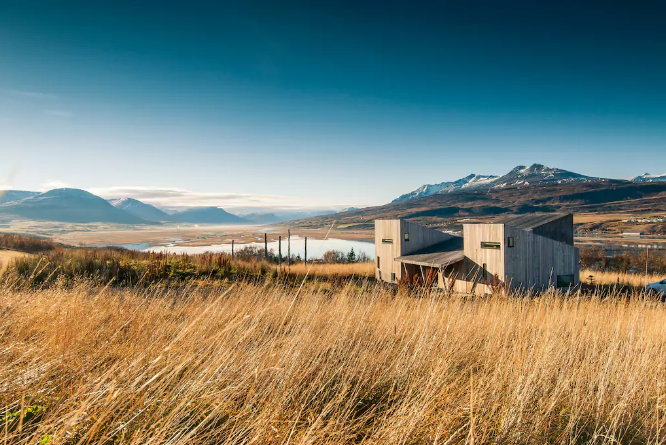
There are also lots of private rooms renting in Reykjavik and across the country for under £25 per night on Airbnb.
Get £30 off Airbnbs in Iceland
Pods in Iceland
A better budget option — but equally fun — are these pod-style cabins in Fossatún. You’re completely surrounded by nature, but each pod has a wifi connection so you’re anything but disconnected out here.
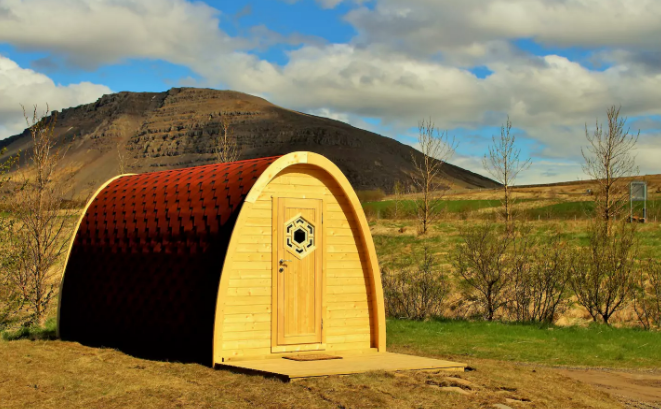
When to Visit Iceland
There are some important factors to consider when deciding what time of year to visit Iceland. These include the weather, the light/dark and the amount of other tourists visiting the country. I always prefer to travel off-season but sometimes that means sacrificing good weather.
For the Northern Lights, you need to visit Iceland during the winter between September – January. However, during this season temperatures can be around 7-8°C during the day and easily reach freezing at night.
If you’re more concerned about good weather and light days, visit in the summer. During the summer months, you can expect a good amount of light between 9am – 3pm everyday and comfortable temperature. Peak season is June – July though and this is when Iceland will be visited by the most tourists.
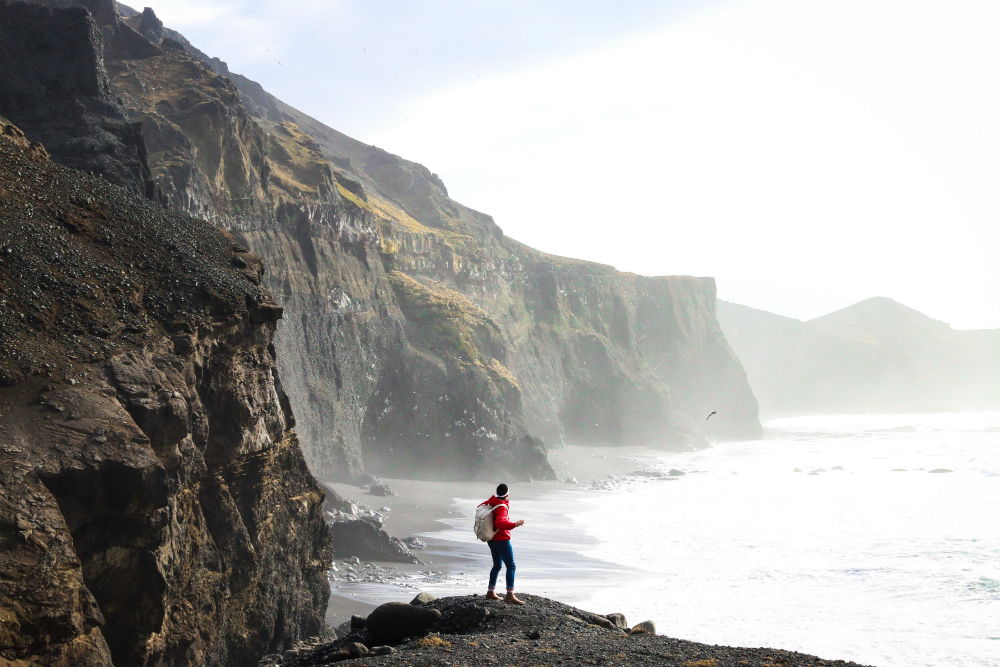
How to Get to Iceland
Travelling to Iceland used to be expensive but since the introduction of economy airline flight paths between London and Iceland and other major cities to Iceland, flight prices are cheaper. You can often get budget flights with Ryanair that fly directly from major cities. I always use an airline comparison site to find the best deals.
How to Travel Around Iceland
Coach / Minibus — On my first trip to Iceland, I was on a coach-tour with a school group. There are many organised coach tours and minibus tours that take small and large groups around Iceland. On the plus side, this is great if you don’t have much time to organise your trip. On the downside, you don’t have so much freedom to explore on your own.
Car Rental — Renting a car is becoming a very popular way to get around Iceland. There’s a ring road that wraps around the country so the route is straightforward. If you can, I’d recommend taking at least 8 days to explore Iceland by car and a little more if you’re keen to do some longer hikes or activities. Be wary that in the winter months, driving conditions can be extremely difficult and roads may be closed due to ice and snow.
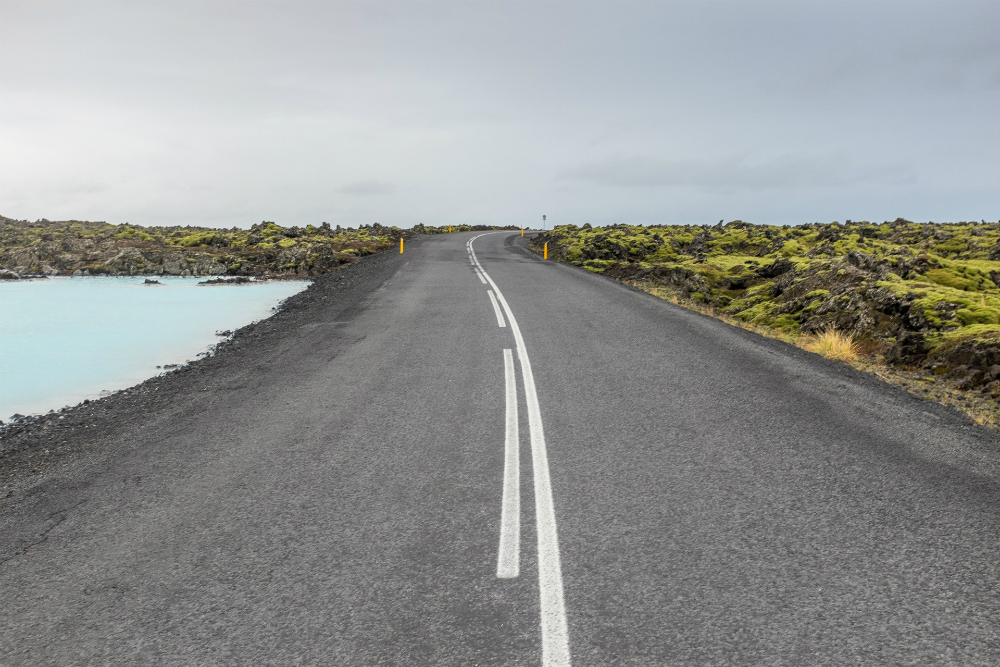
More Slow Travel Guides
Love travelling slowly like we do? Our slow travel guides give you travel ideas and travel routes in countries across the world.
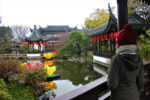

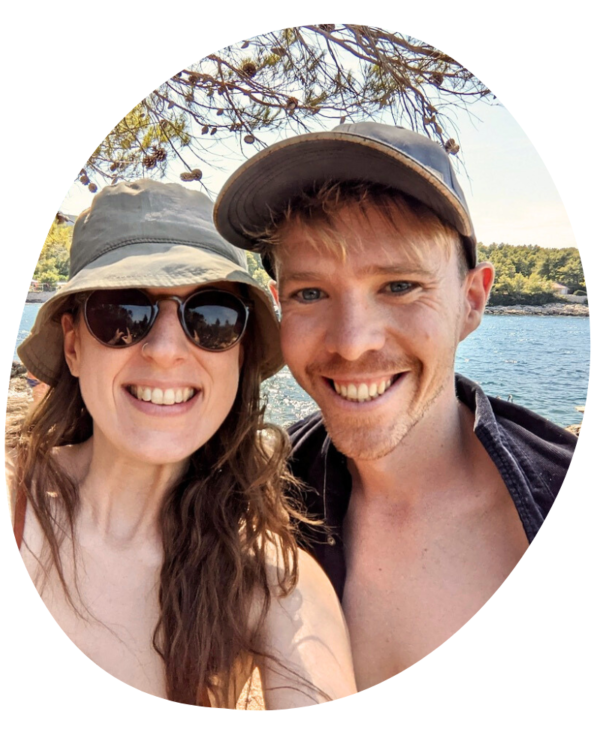


Therie
I should probably move Iceland higher on my travel wish list. The landscapes are otherworldly!
Charlie Marchant
Otherworldly is a great way to describe Iceland’s scenery!
Laura
I can’t believe Iceland is still on our to-visit list! What a beautiful looking place! Thanks for sharing these tips. We’ll put them to good use when we finally make it there! :-)
Charlie Marchant
Great, Laura! It’s definitely on my revisit list as I visited when I was really young and am keen to see more of the country.
Kevin's Travel Diary
Great guide and thanks for sharing, I’m headed out to Iceland in November in search for the Northern Lights, I missed them in Norway, Sweden and Finland. I can’t fail here, This guide has been very helpful.
Charlie Marchant
Good luck! I hope you get to see them and would love to see photos, Kevin!
Nina
This is such a good guide and just in time too because I’m going in September! I haven’t decided on any of the details but this is helping me marinate on what I want to do when I’m there. I hope I get to see the auroras, obviously… haha and of course see all the waterfalls possible.
Charlie Marchant
Awesome, Nina! I hope you have an amazing trip in September. How long will you be there?
CJ Haughey
Meeting people from Sweden and Norway has just pushed those countries higher up in my list. But how can I do a Scandinavia trip and not do Iceland?! It’s so small, just a little more :)
How long would you recommend as the ideal length of trip to do Iceland? It’s such an intriguing place but it’s hard to look past the price tag when Norway and Sweden are so expensive too.
Vacation in Germany
Hey, Charlie
First, of all thanks for sharing a great stuff, Iceland is a magical place. it is a look like the different planet in the world.
Prime Adventure
Going to Iceland this upcoming winter is an option for me and this post really makes me consider it more. Unfortunately I will not have a full week but looks like there are still things to explore!